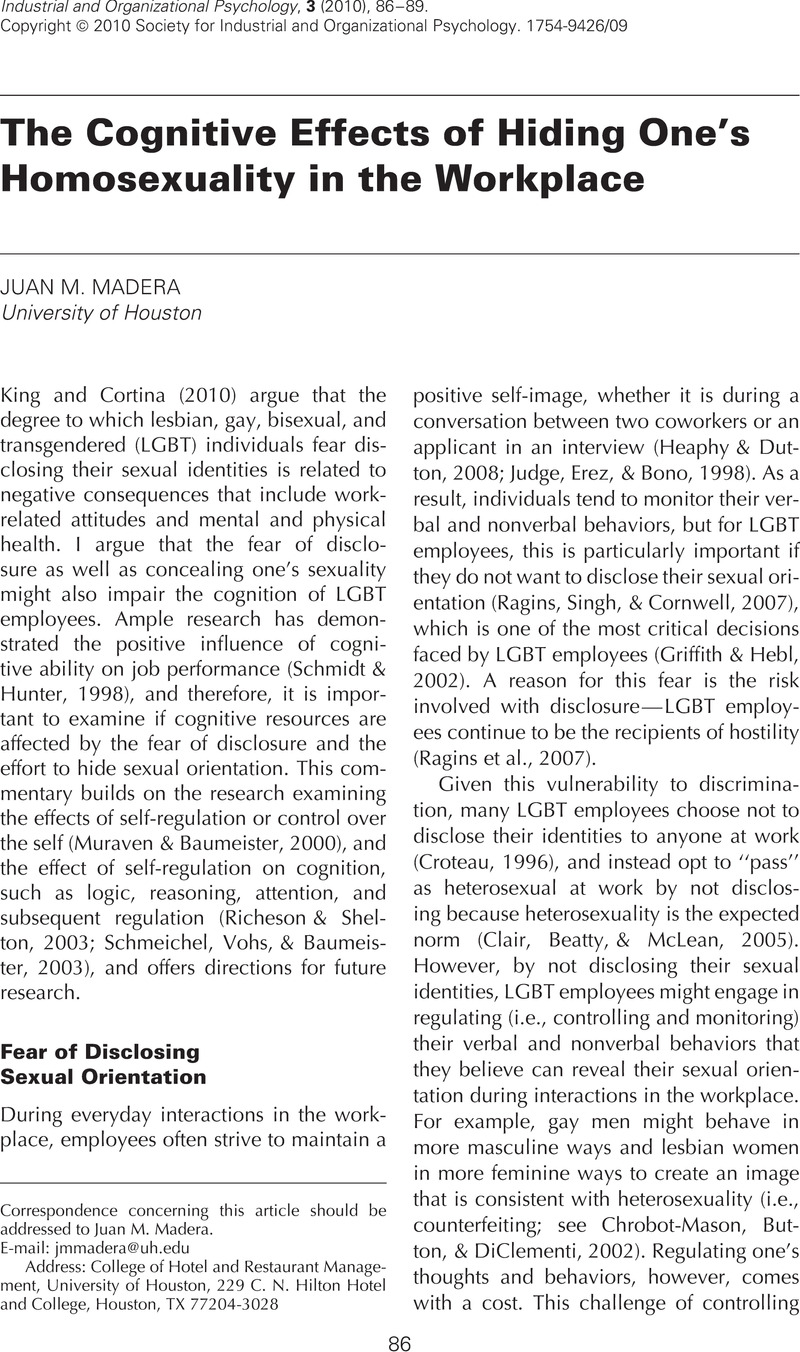Crossref Citations
This article has been cited by the following publications. This list is generated based on data provided by Crossref.
King, Eden B.
and
Cortina, José M.
2010.
Stated and Unstated Opportunities and Barriers to Lesbian, Gay, Bisexual, and Transgendered Supportive Organizations.
Industrial and Organizational Psychology,
Vol. 3,
Issue. 1,
p.
103.
Ozeren, Emir
2014.
Sexual Orientation Discrimination in the Workplace: A Systematic Review of Literature.
Procedia - Social and Behavioral Sciences,
Vol. 109,
Issue. ,
p.
1203.
McFadden, Ciarán
2015.
Lesbian, Gay, Bisexual, and Transgender Careers and Human Resource Development.
Human Resource Development Review,
Vol. 14,
Issue. 2,
p.
125.
McFadden, Ciarán
and
Crowley-Henry, Marian
2016.
Sexual Orientation and Transgender Issues in Organizations.
p.
63.
Geoffroy, Marie
and
Chamberland, Line
2016.
Discrimination des minorités sexuelles et de genre au travail : quelles implications pour la santé mentale ?.
Santé mentale au Québec,
Vol. 40,
Issue. 3,
p.
145.
Ryan, William S.
Hunger, Jeffrey M.
and
Major, Brenda
2017.
Applying Intergroup Relations Research to Understanding LGB Health Disparities.
Journal of Social Issues,
Vol. 73,
Issue. 3,
p.
477.
Cheung, Iva W.
2017.
Plain Language to Minimize Cognitive Load: A Social Justice Perspective.
IEEE Transactions on Professional Communication,
Vol. 60,
Issue. 4,
p.
448.
Arena, David F.
and
Jones, Kristen P.
2017.
To “B” or not to “B”: Assessing the disclosure dilemma of bisexual individuals at work.
Journal of Vocational Behavior,
Vol. 103,
Issue. ,
p.
86.
Williamson, Rachel L.
Beiler-May, Angela
Locklear, Lauren R.
and
Clark, Malissa A.
2017.
Bringing home what I′m hiding at work: The impact of sexual orientation disclosure at work for same-sex couples.
Journal of Vocational Behavior,
Vol. 103,
Issue. ,
p.
7.
Wicks, David
2017.
The consequences of outness: gay men’s workplace experiences.
Management Decision,
Vol. 55,
Issue. 9,
p.
1868.
McFadden, Ciarán
and
Crowley-Henry, Marian
2018.
‘My People’: the potential of LGBT employee networks in reducing stigmatization and providing voice.
The International Journal of Human Resource Management,
Vol. 29,
Issue. 5,
p.
1056.
Weidhaas, Allison D.
2018.
Female business owners hiding in plain sight.
International Journal of Gender and Entrepreneurship,
Vol. 10,
Issue. 1,
p.
2.
Hamilton, Kelly M.
Park, Lauren S.
Carsey, Timothy A.
and
Martinez, Larry R.
2019.
“Lez be honest”: Gender expression impacts workplace disclosure decisions.
Journal of Lesbian Studies,
Vol. 23,
Issue. 2,
p.
144.
Purnell, David F.
2020.
I Should Have Been Wearing the Pink Triangle.
Departures in Critical Qualitative Research,
Vol. 9,
Issue. 1,
p.
46.
Witte, Tracy K.
Kramper, Sharon
Carmichael, K. Paige
Chaddock, Michael
and
Gorczyca, Ken
2020.
A survey of negative mental health outcomes, workplace and school climate, and identity disclosure for lesbian, gay, bisexual, transgender, queer, questioning, and asexual veterinary professionals and students in the United States and United Kingdom.
Journal of the American Veterinary Medical Association,
Vol. 257,
Issue. 4,
p.
417.
Worst, Steff
and
O’Shea, Saoirse C.
2020.
From Chess to Queergaming: ‘Play’ing with and disrupting heteronormative assumptions in the performance of gender and sexual orientation.
Human Resource Development International,
Vol. 23,
Issue. 5,
p.
519.
Lee, David
Johansen, Morgen
and
Bae, Kwang Bin
2021.
Organizational Justice and the Inclusion of LGBT Federal Employees: A Quasi-Experimental Analysis Using Coarsened Exact Matching.
Review of Public Personnel Administration,
Vol. 41,
Issue. 4,
p.
700.
Trujillo, Michael A.
and
Mendes, Wendy Berry
2021.
An ignored minority status: Consequences for sexual minorities living in a biased society.
Social and Personality Psychology Compass,
Vol. 15,
Issue. 10,
Zlateva, Nina
Ivanov, Stanislav
and
Popshterev, Boris
2022.
The impacts of LGBT inclusion on business processes: The case of Bulgaria.
Journal of General Management,
Vol. 48,
Issue. 1,
p.
98.
Barbee, Harry
and
McKay, Tara
2023.
Do supportive work environments matter for minority aging? Work stress and subjective cognitive impairment among middle-age and older lesbian, gay, bisexual, transgender, and queer adults.
Acta Psychologica,
Vol. 237,
Issue. ,
p.
103949.



